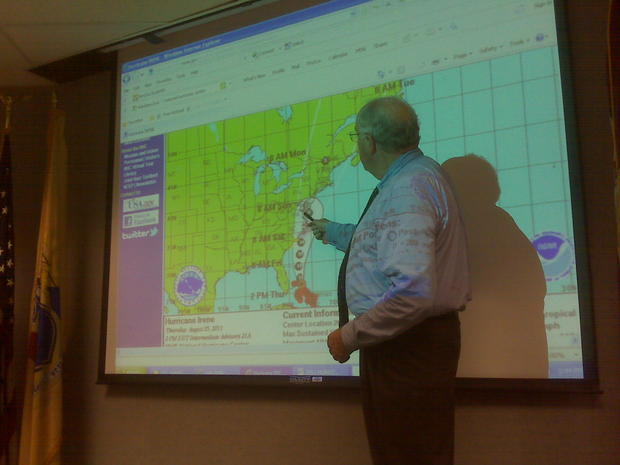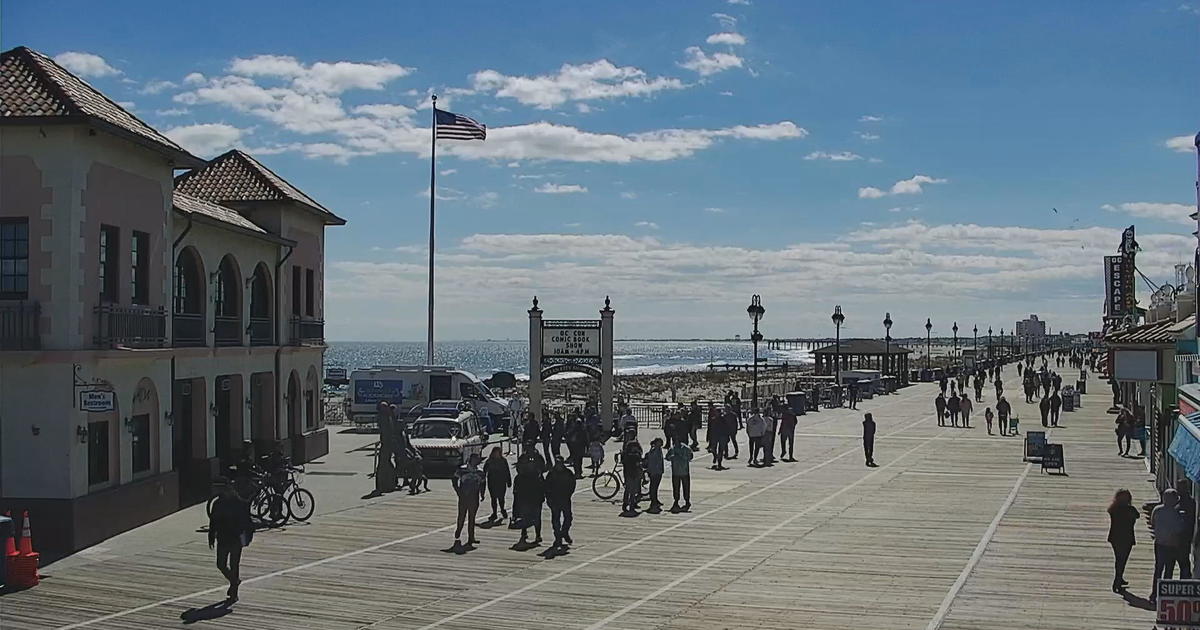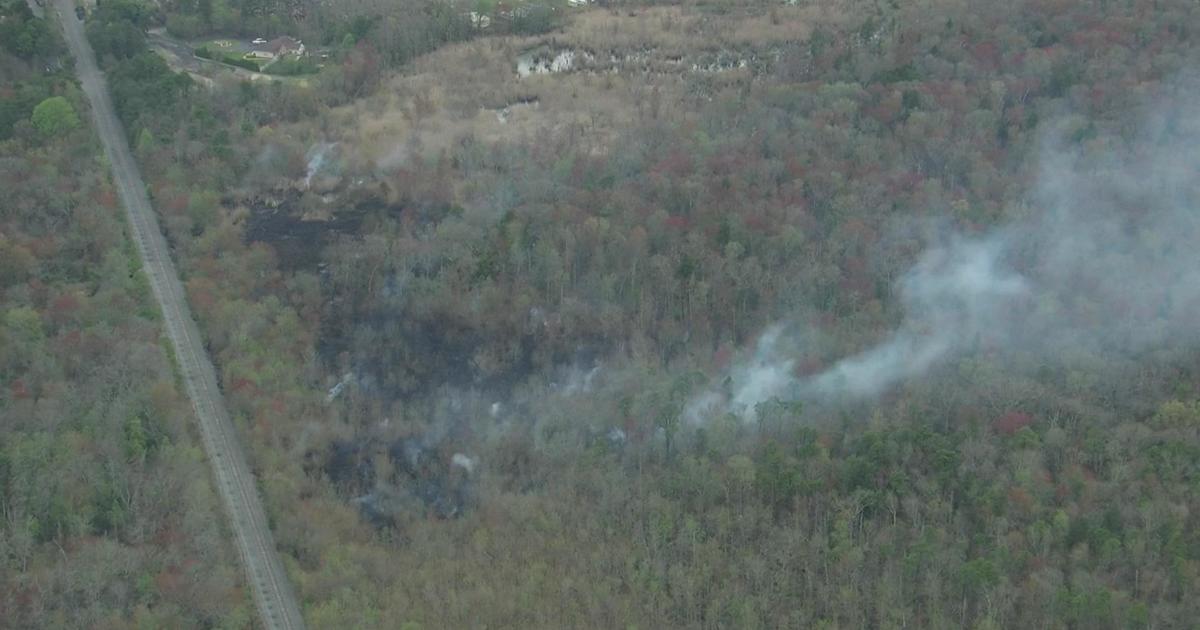Evacuations Ordered In Parts Of Atlantic, Cape May And Ocean Counties Ahead Of Hurricane Irene
EWING, N.J. (CBS/AP) -- A mandatory evacuation of Cape May County's barrier islands began Thursday afternoon, and an evacuation of the rest of the county's residents was ordered for 8 AM Friday, just hours after Gov. Chris Christie asked all visitors to New Jersey's shore to get out by midday Friday with Hurricane Irene poised to be a "serious, significant event."
According to officials, in response to Governor Christie's request that all residents of Cape May County evacuate, Cape Regional Medical Center has cancelled all elective surgeries and outpatient services.
Mandatory evacuations were also ordered for Atlantic County barrier Islands and areas east of Route 9 as of 6 a.m. Friday. Voluntary evacuation were to begin at 8 p.m. Thursday.
Mandatory evacuations were also issued for Long Beach Island, Ocean County starting at 8 a.m. Friday.
"Do not try to ride it out. It is not the smart thing to do," Christie told a news conference about midday Thursday at the State Police Regional Operations Intelligence Center.
He also told people who had been planning to visit the shore this weekend to stay home: "Do not go," he said.
While declaring a state of emergency, the governor did not make evacuations mandatory but said he would consider them if people didn't heed the state's warnings.
He said it was especially important visitors leave the state's barrier islands. He and his family were leading by example, leaving the governor's summer residence on Island Beach State Park on Thursday.
Forecasters say that Irene, moving through the Bahamas on Thursday and heading toward the North Carolina coast, could deliver rain and winds to the populous Northeast over the weekend, and bear down on New Jersey sometime Sunday. Rain brought Thursday by a weather system unrelated to Irene made the flood prospects even worse.
Forecasters say it Irene is not likely to come ashore in New Jersey as a hurricane, but most storm projections show it passing close enough to the already rain-soaked state to cause flooding— maybe along many waterways—and tree-toppling winds that could take down power lines.
With projections that the storm will affect New Jersey becoming clearer on Thursday, there were more local preparations.
In flood-prone Passaic County, jail inmates were being scheduled to fill sandbags Friday and Saturday in Little Falls and Pompton Lakes.
Atlantic City Power began telling customers that if power outages hit, it could take days to restore service everywhere.
The resort town of Avalon, south of Atlantic City, was one of the first to recommend people get out before the storm.
Inspectors were also making sure the state's four nuclear power plants were secured for the storm.
Part 1
Part 2
Officials in Pequannock Township were asking the state to open floodgates to minimize damage in that area, one of many in the state where rivers were already swelling because of an August that has delivered twice as much rain as average.
The Cape May-Lewes Ferry cancelled service for Saturday night and Sunday.
Rutgers University switched dorm move-in day for its New Brunswick-Piscataway campus from Sunday to Saturday in hopes of missing the storm; Seton Hall University in South Orange made a similar decision, telling students that they should plan to arrive before 2 p.m. Saturday or wait until Monday.
The Federal Emergency Management Agency said it would send workers to every state along the East Coast and was setting up a stockpile of supplies including ready-to-eat meals, water and generators at New Jersey's McGuire Air Force Base.
The nature of New Jersey's coastline could make evacuations tricky. Several locations that swell with vacationers and summer residents are on long, narrow barrier islands where causeway traffic jams are a part of life on most summer weekends. And some of the key shore roads are low-lying and flood-prone.
Hurricanes have made landfall on New Jersey just twice in the last 200 years; their destruction isn't really comparable to what a serious storm could do now in a state with 8.8 million people and coastal areas packed with homes and businesses. An 1821 storm that clipped Cape Hatteras in North Carolina and Cape Henlopen in Delaware struck Cape May, at New Jersey's southern tip, then moved north along the shore. One that came ashore in 1903 battered the Atlantic City area.
New Jersey has been affected regularly by hurricanes that don't make land in the state but passed by closely enough to do damage, including a major 1944 storm that killed nine people. In 1985, Gloria was not as bad as expected, but still caused evacuations on Cape May County and closed Atlantic City's casinos.
In 1999, remnants of Hurricane Floyd moved up along the state's western edge as a tropical storm wet enough to cause significant inland flooding that did $250 million in damage, knocked out power for 650,000 and killed six people in the state.
State Climatologist Dave Robinson said that New Jersey, on average, had received 8.7 inches of rain by Wednesday—twice the monthly average.
Skip Sindoni, a spokesman for PSEG Nuclear, which operates three of the state's four nuclear reactors, said inspections were under way to make sure the plants' water-tight doors are working and to secure anything that could be loosened by the wind. He said the plants would be taken offline if it looks like hurricane-force winds are within two hours. He also said they could be shut down if floodwater reaches a certain level. PSEG runs the three nuclear plants on Salem County's Artificial Island on the Delaware Bay. The fourth, Oyster Creek, is near the coast in Ocean County. It is the nation's oldest operating nuclear power plant.
(Copyright 2011 by the Associated Press. All rights reserved.)
RELATED LINKS:
New Jersey Office Of Emergency Management
Ready.gov: New Jersey




